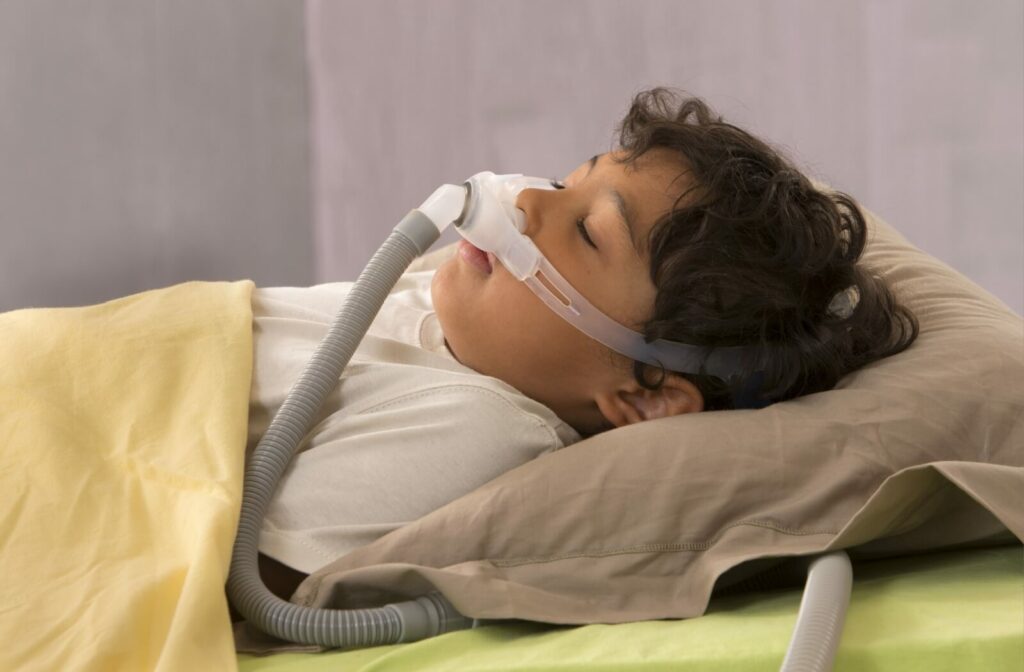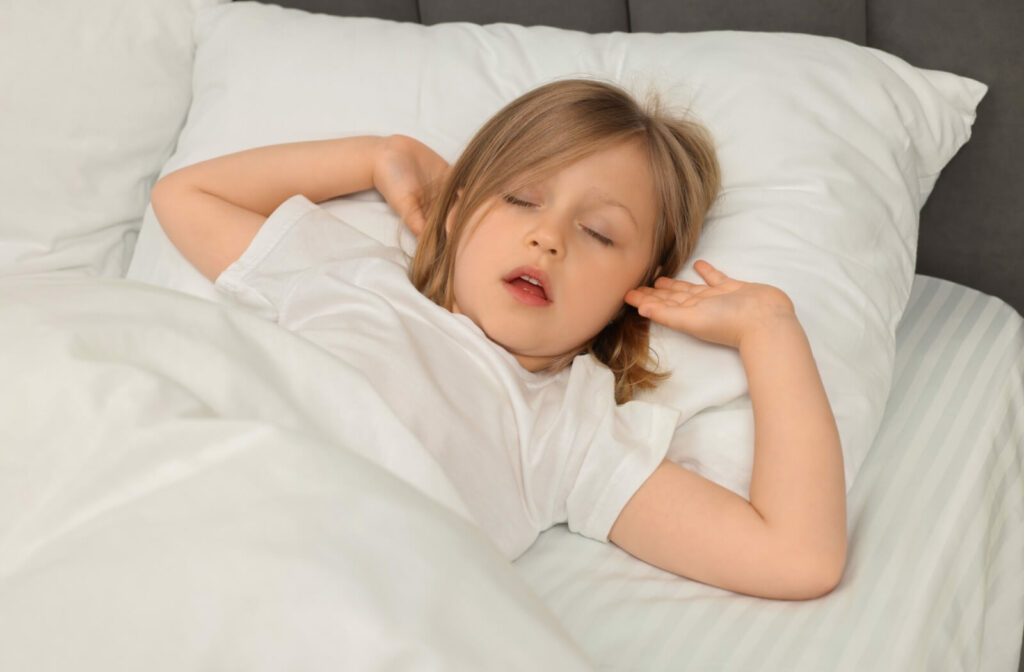It’s easy to dismiss snoring or restless sleep as just a normal part of childhood, but in some cases, these symptoms can point to a deeper issue that may be affecting your child’s health, development, and ability to thrive during the day.
The Pediatric Sleep Apnea Quiz is a simple, parent-friendly checklist of common signs such as snoring, mouth breathing, frequent fatigue, or behavioural changes that could mean a child is experiencing disrupted sleep and airway issues. Use this quiz as a first step toward recognizing whether a professional evaluation might be helpful for your child’s long term well being.
What is Pediatric Sleep Apnea?
Sleep apnea in children differs from the adult version in several important ways. While adults typically experience loud snoring and daytime fatigue, children with sleep apnea might display behavioural changes, difficulty concentrating, or developmental delays.
The most common type in children is obstructive sleep apnea (OSA), which occurs when the airway becomes partially or completely blocked during sleep. This blockage can result from enlarged tonsils or adenoids, jaw structure issues, or other anatomical factors that affect breathing.
Children’s developing brains and bodies are particularly vulnerable to the effects of disrupted sleep. When sleep apnea interferes with deep, restorative sleep cycles, it can impact growth hormone production, cognitive development, and immune system function.
Take the Pediatric Sleep Apnea Quiz
Answer the following questions based on your observations of your child’s sleep patterns and daytime behaviour over the past few months. Each “yes” answer indicates a potential warning sign that deserves attention.
Sleep-Related Symptoms
- Does your child snore regularly or loudly?
While occasional light snoring can be normal, persistent loud snoring—especially if it’s accompanied by gasping or choking sounds—may indicate airway obstruction.
- Have you noticed pauses in your child’s breathing during sleep?
These episodes might last several seconds and are often followed by gasping, snorting, or sudden movements as your child’s body attempts to restore normal breathing.
- Does your child sleep in unusual positions?
Children with sleep apnea often sleep with their neck hyperextended, propped up on multiple pillows, or in other positions that help keep their airway open.
- Is your child a restless sleeper?
Frequent tossing, turning, kicking, or falling out of bed could indicate that your child’s sleep is being disrupted by breathing difficulties.
Daytime Behaviour & Development
- Does your child seem tired during the day despite adequate sleep time?
Chronic fatigue, difficulty waking up, or needing frequent naps might suggest that your child isn’t getting quality sleep at night.
- Have you noticed changes in your child’s behaviour or mood?
Sleep-deprived children are often irritable, hyperactive, or have difficulty regulating their emotions. Some children may be misdiagnosed with ADHD when sleep apnea is the underlying cause.
- Is your child having trouble concentrating or performing well in school?
Poor sleep quality can significantly impact cognitive function, memory, and academic performance.
- Has your child’s growth rate slowed?
Sleep apnea can interfere with growth hormone production, potentially affecting your child’s physical development.

Physical Signs & Health Issues
- Does your child breathe through their mouth frequently?
Chronic mouth breathing, especially during the day, can indicate nasal obstruction or other airway issues.
- Are your child’s tonsils or adenoids enlarged?
Large tonsils and adenoids are common causes of airway obstruction in children and can often be observed during routine oral examinations.
- Does your child wet the bed regularly after being potty-trained?
While bedwetting can have many causes, but it’s sometimes associated with sleep apnea in children who were previously dry at night.
- Has your child experienced frequent upper respiratory infections?
Recurring ear infections, sinus problems, or respiratory issues might be related to airway obstruction and poor sleep quality.
Interpreting Your Results
If you answered “yes” to three or more questions, especially those related to breathing disruptions during sleep, it’s definitely worth discussing your concerns with your child’s healthcare provider. Multiple symptoms indicate a pattern that deserves professional evaluation.
Even one or two “yes” answers shouldn’t be ignored, particularly if they involve serious symptoms like breathing pauses during sleep or significant behavioural changes. Trust your parental instincts, you know your child best.
Remember that this quiz is only a screening tool, not a diagnostic test. A healthcare professional will need to conduct a thorough evaluation, which might include a sleep study, to determine if your child has sleep apnea and what treatment options would be most appropriate.
Take Action for Better Sleep
Your child deserves restful, restorative sleep that supports healthy growth, emotional balance, and daily energy. If this sleep apnea quiz has raised concerns about your child’s sleep patterns, do not hesitate to seek professional guidance and support.
Contact Bloom Orthodontics today to schedule a consultation. Our experienced team can evaluate your child’s airway health and collaborate with you to develop a personalized and comprehensive treatment plan that promotes better sleep and long-term wellness.


